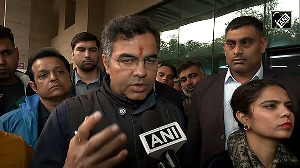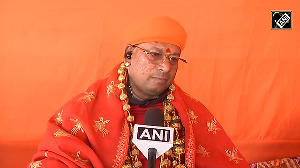Congress spokesperson Jaiveer Shergill quit the party on Wednesday, alleging that sycophancy is eating into the organisation like "termites".

In a letter to party chief Sonia Gandhi, Shergill resigned from the post of its national spokesperson, saying the primary reason was that "the ideology and the vision of the current decision makers of the Congress is no longer in sync with the aspirations of the youth and modern India".
"Furthermore, it pains me to say that decision making is no longer for the interest of the public and the country, rather it is influenced by the self-serving interests of individuals indulging in sycophancy and consistently ignoring ground reality. This is something I cannot morally accept or continue to work with," he wrote.
"However, I shall forever remain indebted for all the opportunities the party has granted me during my association with it," Shergill said.
Asked if he resigned from the party posts or its primary membership, he said both.
Elaborating on the reasons why he quit the Congress, Shergill told PTI that decisions were not being taken by the party in public interest and those indulging in sycophancy and ignoring ground realities dominate in the party.
"Those who are capable, want to serve the people, their voices are not heard," he said.
"Sycophancy and coterie is eating into the Indian National Congress as termites," he told PTI.
On his future plans, Shergill said they would only be known in the future.
He added that he had severed all ties with the Congress.
Shergill, a prominent face on TV debates, is the latest to join the 'leave Congress' bandwagon of young leaders quitting the party now struggling to shore up its dwindling electoral fortunes.
Earlier this year, RPN Singh, a former Union minister and son of the late Congress leader CPN Singh, joined the ranks of Jitin Prasada and Jyotiraditya Scindia, who too quit the party to join the Bharatiya Janata Party over the last couple of years.
While Jitin Prasada is the son of Jitendra Prasada, Scindia's father was Madhavrao Scindia, both Congress veterans.
Singh's exit came just months after Sushmita Dev, another young Congress leader, who quit the party to join the Trinamool Congress.
The story of senior leaders leaving the Congress began ahead of the 2014 Lok Sabha elections when the party lost Haryana heavyweights Birender Singh and Rao Inderjit Singh. Both went on to become ministers in Prime Minister Narendra Modi's first cabinet.
There have been others too.
Former Assam Congress stalwart Himanta Biswa Sarma left for the BJP in 2015 and climbed the saffron ladder to become the chief minister of the state.
Some other prominent Congress leaders and former Union ministers of the UPA government who quit the party and joined the BJP include S M Krishna and Jayanti Natarajan. Krishna is a former chief minister of Karnataka, and Natarajan was the Union environment minister during the UPA regime.
The Congress also lost once Gandhi family loyalist and former scion of the former Amethi royal family Sanjay Sinh to the BJP last year.
Former Maharashtra chief minister Narayan Rane and then leader of opposition in the state assembly Radhakrishna Vikhe Patil quit the party to join the BJP in 2019.
The Congress also suffered a jolt in 2019 in Assam when its chief whip in Rajya Sabha, Bhubaneswar Kalita, suddenly quit and joined the BJP. He is now a BJP Rajya Sabha member from the state.
Also in the northeast, the Congress suffered setbacks when its former chief minister in Manipur N Biren Singh joined the BJP in 2016, citing differences with then incumbent Ibobi Singh.
In Arunachal Pradesh, Chief Minister Pema Khandu had left the Congress in 2016 before the assembly elections.
In Uttar Pradesh too, ahead of 2017 assembly elections, former state Congress chief Rita Bahuguna Joshi quit the party.
Other prominent faces who left the Congress in the recent past include Tamil actor Khushboo Sundar and former Congress spokesperson Tom Vaddakan, both of whom joined the BJP.
While the leaders quitting the Congress have cited various reasons, from not being heard by the leadership to leaving for better prospects, the party has repeatedly called out their weak ideological moorings.











 © 2025
© 2025